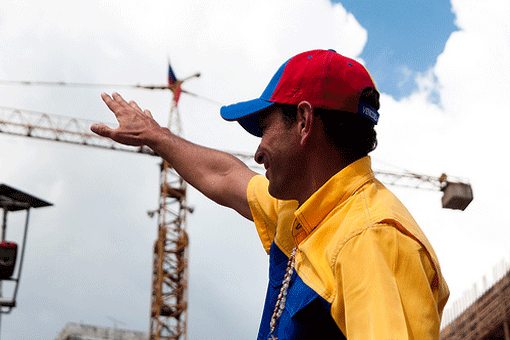While President Hugo Chávez of Venezuela remains in Cuba recovering from his fourth cancer surgery on the island, millions of his supporters delivered a solid political victory for his party in the country’s regional elections on December 16.
Of the 23 governorships that exist in Venezuela, the Partido Socialista Unido de Venezuela (United Socialist Party—PSUV) won at least 19, extending its political supremacy in the country and taking four of eight states previously held by the opposition.
What the country faces, at this point, is a political map painted red, with the isolated, though key, exceptions of the states of Miranda, Lara and Amazonas—and possibly Bolívar, where Andrés Velásquez, the narrowly-defeated opposition candidate, has formally contested the results of the election.
With or without a reversal in Bolívar, the opposition’s defeat is clear and potentially devastating. But as Chávez opponents reckon with the results, it is still unclear just how bad things will get for the opposition moving forward.
In the days that have followed the election, local analysts critical of the Chávez regime have called the results a debacle for the opposition, pointing out the heavy losses in Zulia, Táchira and Carabobo states, all important strongholds for the opposition.
Others, however, have found solace in the electoral victory of Henrique Capriles Radonski, who, after leading an unsuccessful bid for the presidency in October, was reelected governor of Miranda.
This group is calling for calm and perspective. They remind their supporters that despite the PSUV’s victory in all but three states the total number of votes won by government versus opposition candidates was not much different from the results of the presidential election in October.
Chávez beat the opposition candidate, Capriles, 55 percent to 44 percent on a national level. Regional election numbers indicate a 56 percent to 43 percent victory for the ruling party.
In the months preceding the regional elections, a key question centered on the role that Chávez’ illness would play in the voting process. How, if at all, would his cancer alter the results? Now, the question has become whether the opposition’s recent defeat will affect its hypothetical bid for a new chance at the presidency.
With Chávez physically absent from the political scene, the opposition is now debating whether it can beat Nicolás Maduro, Chávez’ vice-president and anointed successor, in a future presidential election—that is, if the ailing president is unable to assume a new term in office on January 10.
Chávez’ last message to the country lends itself to such speculation. On December 11, he warned Venezuelans on national television about the risks involved in his latest surgery. In the event of his “absolute absence,” Chávez said, those who support his administration should vote for Nicolás Maduro.
The likelihood of Chávez’ death is unknown to those outside his immediate circle. Venezuelans do not know the exact type of cancer that has afflicted the president or the gravity of his illness.
If Chávez cannot be sworn in to another six-year term, the Venezuelan constitution dictates that the country would have to elect a new president within 30 days. The same rule would apply if Chávez were unable to perform the duties of his office after being sworn in as president.
The unofficial prognosis of Venezuelan doctors abroad has made them unabashedly somber about Chávez’ chance of surviving the disease. Some even say that the president will not make it past April 2013. Coupled with the secrecy around Chávez’ illness, these bits of information add to a climate of instability and speculation.
Physically present or not, Chávez, the national icon, was ever-present in the December 16 electoral contests. State officials invoked his name during and after Election Day. In fact, Maduro, who has supplanted Chávez in the leadership of the government, rallied supporters to go to the polls in honor of the cancer-stricken president.
“This is a vote of love for a man who has given everything to the people of Venezuela,” Maduro said. “Let us not fail him today…let us give him our vote and our prayers.”
Maduro’s comment, in mid-election, could constitute a public violation of Venezuela’s electoral law, according to a member of Venezuela’s Electoral Council. Venezuelan law stipulates that all types of electoral campaigning must cease at least three days before the voting begins. Despite this accusation, though, no legal action was taken against the vice-president.
In the hours that followed the election, other public figures from the government dedicated their triumph to the president. In Caracas, Jorge Rodríguez, the national campaign chief for Chávez’ party, called the results “a present” for the socialist leader. “This is a victory of the people,” he said, “but, above all, this a victory for Chávez.”
Some went as far as saying that the government’s victory across the map would help Chávez in his healing process.
Still, despite these political questions, as we approach the holidays shopping centers are crowded and cars carry bundled-up pine trees. Life goes on for a country now accustomed to uncertainty.








